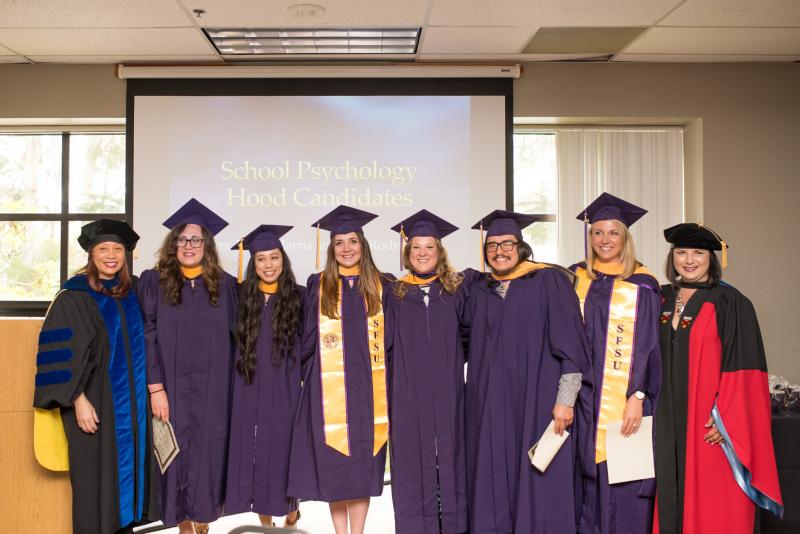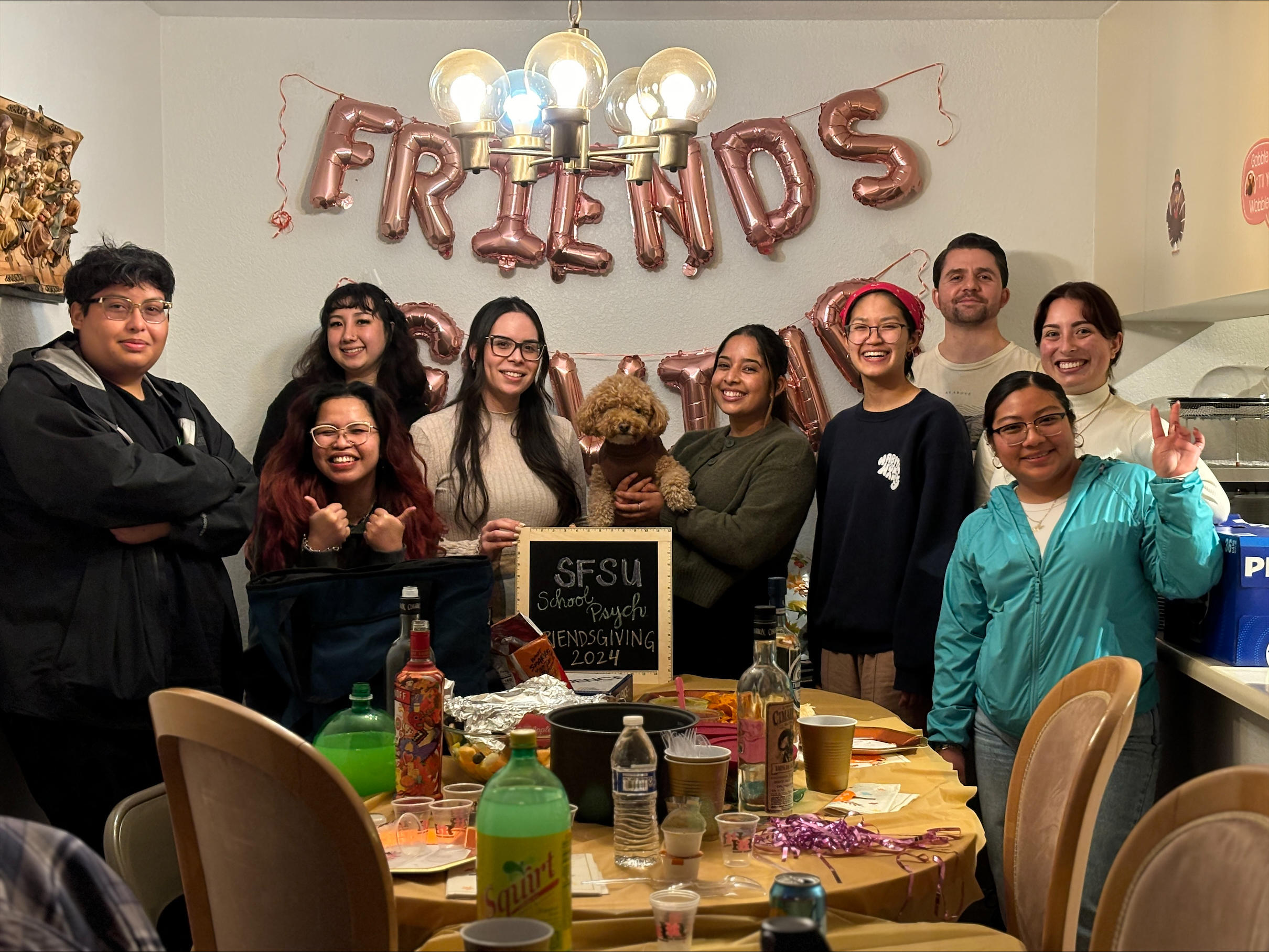Master of Science in School Psychology
*Please note: Due to ongoing enrollment and budgetary challenges, we regret to inform you that we have made the difficult decision to pause admissions to the Psychology Graduate Program’s School Psychology Concentration. As a result, we will not be accepting applications to the program until further notice.*
This degree program leads to the Pupil Personnel Services Credential with authorization in School Psychology. Designed primarily for full-time SF State students, an M.S. is earned after successful completion of the fourth semester and the Pupil Personnel Services Credential with an authorization in School Psychology is awarded after successful completion of the sixth semester in the program.
Prerequisites
Acceptance into the M.S. program is based upon evidence of psychological experience with children and families in institutions such as schools and service-oriented settings. Academic preparation is demonstrated by the capacity to make use of graduate-level academic work and professional training. These qualifications may be assessed by a record of previous academic accomplishments in psychology or other related fields that emphasize an understanding of children and their families and include clinical work experience. Students entering the program should have completed upper-divsion courses in statistics or research design (preferably both), developmental psychology, clinical psychopathology (may be called "abnormal psychology" at some universities, learning, and cross-cultural/multicultural psychology.
Master of Science in School Psychology Curriculum
| Course | Title | Units |
|---|---|---|
| PSY 857 | Behavior Management | 3 |
| PSY 721 | Clinical Methods: Assessment of Intelligence | 3 |
| PSY 728 | Conference to Accompany Psychology Practicum (Fall) | 3 |
| PSY 728 | Conference to Accompany Psychology Practicum (Spring) | 3 |
| PSY 729 | Psychology Practicum (Fall) | 3 |
| PSY 729 | Psychology Practicum (Spring) | 3 |
| PSY 753 | Seminar in Therapeutic and Developmental Change I | 3 |
| PSY 754 | Seminar in Therapeutic and Developmental Change II | 3 |
| PSY 722 | Clinical Methods: Personality Appraisal and Projective Techniques | 3 |
| PSY 770 | Research Methods and Techniques | 3 |
| PSY 829 | Advanced Psychology Practicum (Fall) | 3 |
| PSY 829 | Advanced Psychology Practicum (Spring) | 3 |
| PSY 855 | Seminar in Professional School Psychology | 3 |
| PSY 891 | Seminar in Selected Problems (The Consultation Process) | 3 |
| PSY 896 & 896EXM |
Directed Reading (6 units total) and Culminating Experience Examination (3 units) |
9 |
| or | ||
| PSY 898 | Master's Thesis and Oral Defense | 3 |
| SPED 763 | Transition Planning for Students with Disabilities | 3 |
| SPED 772 | Assessment, Curriculum, and Instruction for Students with Mild/Moderate Support Needs | 3 |
| SPED 788 | Law, Ethics, and Instructional Planning | 3 |
| SPED 801 | Development, Diversity, and English Language Learners: Special Education | 3 |

Laura Jarvis (Class of 2018) defending her Master's Culminating Experience

The School Psychology 2017 Cohort at the MS Hooding Ceremony

School Psychology 2022 Cohort Friendsgiving!
Frequently Asked Questions
We usually admit 8 - 10 students.
Students entering the program are required to complete upper-division courses in:
- statistics or research design (preferably courses in both)
- developmental psychology
- clinical psychopathology (may be called “abnormal psychology” at some universities)
- cross cultural/ multicultural psychology
Comparable courses may be considered to fulfill some of these requirements but courses from community colleges are not acceptable, as they are lower-division.
Your previous work as a teacher and in the recreation and tutoring programs would be considered in the application process. However, we are looking specifically for experiences in human service agencies/organizations and schools where you work clinically with children, adolescents, adults and/or families. Experience in a clinical setting includes any position, paid or unpaid, that is related to the skills needed to be a psychologist. Examples of this sort of experience include a research assistant, work in a group or residential treatment facility, work in a hospital or community mental health organization, or work as a teacher with children who are behaviorally or emotionally disturbed. When you write about these experiences in your personal statement, you should emphasize what you learned about yourself (your insight) from these experiences and what you have learned about the students and their families (e.g., child development, family dynamics, school systems). Some applicants make the mistake of listing their experiences without making clear to the reader what they learned from them and how it has prepared them to succeed in graduate school.
Typically, applicants must take the general portion of the GRE (not the subject portion). However, for the Fall 2023 application cycle, the GRE requirement has been waived.
No, there are no minimum cutoffs for the GRE test scores. GRE test scores are evaluated in the context of the full application package. These scores are seen as indicators of the applicant's potential for successful graduate work. However, we also consider course history, letters of recommendation, the applicant's essay, psychological experience, and the likelihood of a good fit between the applicant's interests and the program.
After the applications are thoroughly reviewed some applicants are invited to visit our campus for a face-to-face interview with a team of current school psychology graduate students and the program Director. After the interviews, 8 - 10 students are selected for admission. The selection process can take up to one and a half months. Applicants are usually notified of their admission status by April.
You are required to apply to both the Psychology Department and the University.
For an online application to Psychology Department, please visit the Psychology Department website and click on "Graduate Application": Psychology Graduate Application
Or, you can write or call the Graduate Secretary, Department of Psychology, San Francisco State University, 1600 Holloway Avenue, San Francisco, CA 94132. Phone: (415) 338-2711
In addition to applying to the Psychology department, you must apply to the University.
If you are a domestic applicant go to this site: Cal State Apply for domestic applicant
If you are an international applicant go to this site: Cal State Apply for international applicant
February 1
Information sessions are held every fall during the university's Graduate Open House Week. This is usually held at the end of October. Our graduate homepage will provide an announcement closer to the event date after details are finalized.
Questions about the Program
Three years. The first two years are devoted to obtaining the master's degree and the last year is dedicated to pursuing the PPS credential.
This Program is a full-time commitment. Courses are generally offered in the afternoon and evening, and sometimes in the morning. Students are not allowed to work full-time as the program is 3 years and tightly sequenced. Some students work part-time while in the program, however, work hours need to be arranged around program requirements.
There are three levels of fieldwork experience. The first year, the student engages in a clinical fieldwork experience for approximately 15 hours per week in schools under the close supervision of a clinician/School Psychologist. The second year, practicum, the student works approximately 20 to 24 hours per week engaged in School Psychology related activities such as assessment, consultation, and clinical intervention under close supervision by a credentialed School Psychologist. The third year internship is a 36 hour weekly paid placement in the public schools throughout the greater the bay area. Interns are engaged in School Psychology related activities such as assessment, consultation, and clinical intervention under supervision by a credentialed School Psychologist.
The Pupil Personnel Services Credential is the third-year internship program, which is meant to follow the two-year Graduate Program in School Psychology. You can find more information at this link: http://bss.sfsu.edu/psych/graduate/pps_credential.html
We are no longer accepting PPS applications for the foreseeable future.
A culminating experience which is typically a Master's paper (an in-depth literature review or case study on a topic relevant to School Psychology). Students also have the option of doing a Master's thesis, however, almost all complete the Master's paper.
Practicing School Psychologist
School Psychology Links
National Association of School Psychologists
Commission on Teacher Credentialing
Credential Services Teacher Preparation Center
For PDF files, you'll need Adobe Acrobat 5.0 or above to view it. If you need Adobe Acrobat Reader it's available free from Adobe.
The documents on this website/webpage might not be fully accessible to persons with disabilities. We are working to fix these accessibility barriers. If you experience difficulty in accessing this content, please contact psych@sfsu.edu and we will provide you with accessible alternatives.